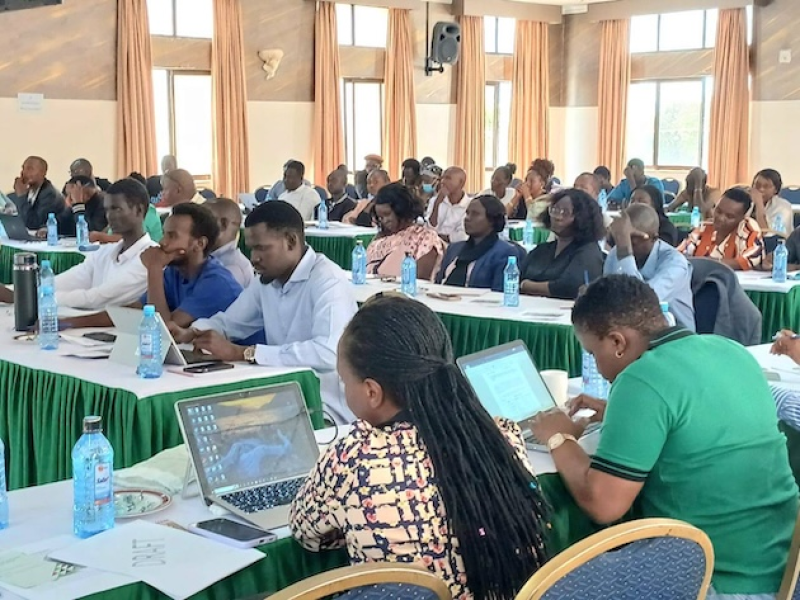- Puppet show enchants Children as Boi Mela comes alive on day 2 |
- DSCC Admin Salam’s drive to make South Dhaka a ‘clean city’ |
- 274 Taliban Dead, 55 Pakistan Troops Killed |
- Now 'open war' with Afghanistan after latest strikes |
- Dhaka's air quality fourth worst in world on Friday morning |
Kenya’s Shirika Plan Offers Refugees Rights and Integration

Refugees gather to give their input on the Shirika plan during a stakeholders’ meeting in Nakuru City, west of Nairobi, earlier in February 2025.
When Jean Baremba arrived in Kenya in 2018, he looked forward to rebuilding a life shattered by war in the eastern Democratic Republic of Congo.
The 42-year-old father of four said he fled the DRC to save his children after their mother was killed in a 2017 dawn attack by rebel fighters on their village.
“The rebels were forcibly recruiting men to fight for their army. Those who resisted were killed and their property torched. I managed to escape; unfortunately, my wife lost her life,” Baremba said.
A skilled carpenter, Baremba and his four children found their way to Kakuma refugee camp, 497 miles northwest of Kenya’s capital, Nairobi.
“Despite all the challenges, Kakuma gave me a second life and renewed hope.”
Kenya hosts approximately 836,907 refugees and asylum seekers. Of these, 51% reside in Dadaab, 36% in Kakuma, and 13% in urban areas. The population comprises 73% refugees and 27% asylum seekers.
The increasing number of refugees, particularly from the Great Lakes region, has strained Kenya amid declining international aid and humanitarian support.
The Department of Refugee Services currently has 220,000 pending refugee and asylum seeker applications.
Initially, the United Nations Refugee Agency (UNHCR) managed refugee affairs, but Kenya assumed responsibility in 2021 following the passage of the Refugee Act.
To address the crisis, Kenya launched the Shirika Plan — a five-year initiative to transform Dadaab and Kakuma into integrated settlements.
“Shirika” is a Swahili word meaning “coming together” or “partnering.”
The plan aims to make refugees economically self-reliant by integrating them into Kenyan society.
It will allow refugees to access education, healthcare, identity documents, business permits, tax numbers, and banking services.
Refugees will also be able to travel and live anywhere in Kenya without a movement permit.
Students will be eligible for government education scholarships, and the Social Health Insurance Fund (SHIF) will cover healthcare needs.
Baremba believes integration will grant refugees the independence they need.
“Integration will allow me to put my carpentry skills to work, and the Kenyan community will form part of my market,” he said.
“With a source of income, I will no longer rely on UNHCR support.”
Mary Ajok, a South Sudanese refugee, hopes the Shirika Plan will address poor shelter, limited food rations, and lack of healthcare.
“Raising children in a refugee camp is challenging. Integration will provide a peaceful and friendly environment,” Ajok said.
She plans to open a catering business serving both refugees and the host community.
At the plan’s launch, President William Ruto described it as a shift from humanitarian aid to a progressive model centered on human rights.
US Embassy Chargé d’Affaires Marc Dillard, chair of the Refugee Donor Group, called the plan a milestone in advancing refugee rights.
The UNHCR will partner with the Kenyan government to implement the plan, which has a projected cost of USD 943 million.
Donors include the World Bank, UNHCR, the International Finance Corporation, and the Kenya Commercial Bank Group.
The Shirika Plan supports the Sustainable Development Goals (SDGs), the African Union’s Agenda 2063, and global commitments like the Global Compact on Refugees (GCR), the 1969 OAU Convention, and the 1951 and 1967 UN Conventions.
Inclusivity and non-discrimination are core principles.
Refugees not wishing to integrate will have options for voluntary repatriation or third-country resettlement.
Some leaders from northern Kenya oppose the plan, citing lack of consultation.
MPs Farah Maalim (Dadaab) and Daniel Epuyo (Turkana West) criticised both the Kenyan government and UNHCR.
“We cannot talk of integrating refugees when locals have pressing needs that are yet to be met,” Epuyo said.
Maalim added, “The hosting communities are not ready for integration. Most refugees would prefer voluntary repatriation with generous support to reintegrate in Somalia.”

